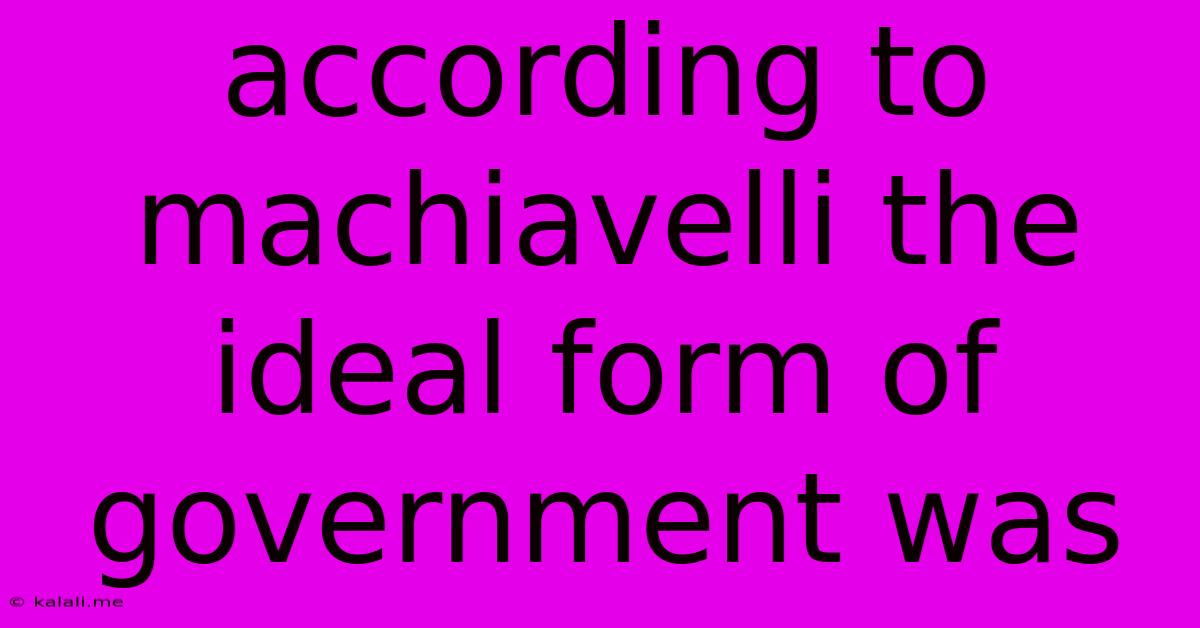According To Machiavelli The Ideal Form Of Government Was
Kalali
Jun 14, 2025 · 3 min read

Table of Contents
According to Machiavelli, the Ideal Form of Government Was... A Pragmatic Approach
Niccolò Machiavelli, the infamous Renaissance political philosopher, didn't prescribe a single "ideal" form of government in the way Plato might have. Instead, his masterpiece, The Prince, offers a pragmatic and often brutal analysis of how to acquire and maintain power, regardless of the specific governmental structure. This article delves into Machiavelli's complex views, exploring his preferences while acknowledging the nuances of his approach. He didn't advocate for a specific system as much as a strategic approach to governance tailored to the circumstances.
Machiavelli’s writings primarily focused on the acquisition and maintenance of power, not on the abstract ideals of different governance models. While he discussed republics and principalities extensively, his true focus was on the effective practice of leadership. His analysis heavily influenced political thought for centuries, sparking both admiration and condemnation.
The Republic vs. the Principality: A Machiavellian Perspective
In Discourses on Livy, Machiavelli explores the virtues of a republican government. He admired the Roman Republic, highlighting its strength, stability, and capacity for expansion. This system, based on civic virtue, checks and balances, and citizen participation, held a certain appeal for him. He saw the potential for greater liberty and a more stable state within a well-functioning republic. However, his analysis was far from utopian. He was acutely aware of the internal conflicts and potential for instability within republics, particularly the dangers of factionalism and the unpredictable nature of popular opinion.
Conversely, The Prince focuses primarily on principalities—states ruled by a single prince or ruler. This isn't an endorsement of authoritarianism, but rather a realistic assessment of the challenges inherent in maintaining control, especially in turbulent times. Machiavelli emphasizes the importance of a strong ruler, capable of making difficult decisions and wielding power effectively, often through methods considered ruthless by modern standards. He believed a single ruler could more swiftly and decisively respond to threats, consolidating power and ensuring the security of the state.
The Importance of Context and Pragmatism
The key to understanding Machiavelli's view on the "ideal" form of government lies in his emphasis on context and pragmatism. He believed that the best form of government was the one that best served the interests of the state, regardless of its structure. This was a stark departure from earlier political philosophers who often prioritized abstract ideals over practical considerations.
For Machiavelli, the stability and longevity of the state were paramount. He would analyze the specific conditions – the prevailing political climate, the nature of the population, the presence of external threats – to determine the most effective approach to governance. A republic might thrive in one situation, while a principality might be necessary in another.
Beyond Structure: The Qualities of a Successful Ruler
Regardless of the form of government, Machiavelli consistently emphasized the importance of certain qualities in a successful leader:
- Virtù: This isn't simply virtue in the moral sense. It encompasses a range of qualities, including strength, decisiveness, cunning, and the ability to adapt to changing circumstances. It’s a pragmatic form of leadership, prioritizing the success of the state above all else.
- Fortuna: Machiavelli recognized the role of chance and fortune in political affairs. A ruler must be capable of adapting to unforeseen events and capitalizing on opportunities when they arise.
- Realistic Assessment of Human Nature: Machiavelli believed that humans were inherently selfish and ambitious. A successful ruler must understand this and act accordingly.
Conclusion: A Flexible Approach to Governance
In conclusion, Machiavelli did not advocate for a single "ideal" form of government. His analysis prioritized the stability and survival of the state, advocating for a flexible approach based on context and the qualities of the ruler. Whether a republic or a principality, the effective exercise of power, guided by a deep understanding of human nature and political realities, was central to his vision of successful governance. He offered not a utopian blueprint, but a practical guide to navigating the complexities of the political world.
Latest Posts
Latest Posts
-
Conductor Atoms Normally Have Answer Valence Electrons
Jun 15, 2025
-
Levels Of Processing Model Psychology Definition
Jun 15, 2025
-
How Many District In Up India
Jun 15, 2025
-
A Monopolist Maximizes Profit By Producing The Quantity At Which
Jun 15, 2025
-
Which Is The Densest Planet In The Solar System
Jun 15, 2025
Related Post
Thank you for visiting our website which covers about According To Machiavelli The Ideal Form Of Government Was . We hope the information provided has been useful to you. Feel free to contact us if you have any questions or need further assistance. See you next time and don't miss to bookmark.